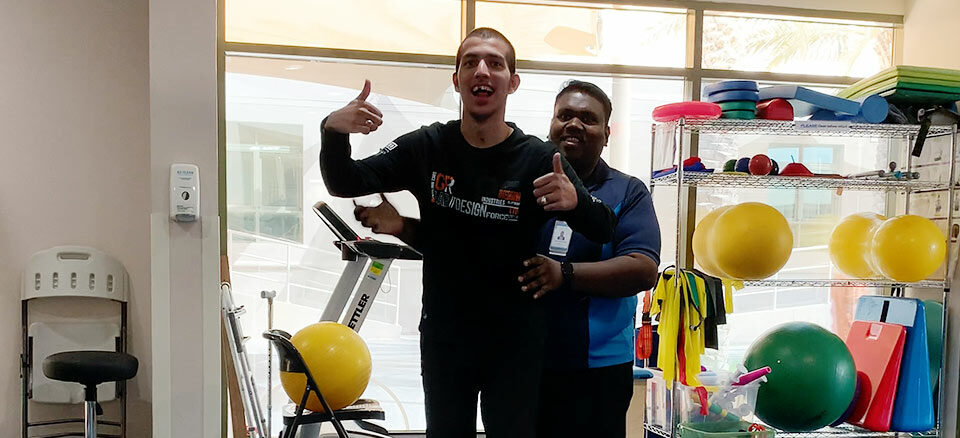On August 11, 2018, a 17-year-old Abdullah Al Mehrezi, being bedridden and developing spasticity in all four limbs due to a dreadful road traffic accident that left him with severe traumatic brain injury, was admitted to the Cambridge Medical & Rehabilitation Center in Abu Dhabi. Along with limited motor abilities to maneuver freely, his initial neurological condition indicated that he was on tracheostomy and fed through a PEG tube. Furthermore, having a quadriplegic bladder, he needed an external catheter to keep a drainage system.
Abdullah was admitted to CMRC under the umbrella of a post-acute rehabilitation program to benefit from the interdisciplinary physical, occupational, and speech therapy module to maximize the improvement potential and endorse Abdullah’s participation in self-care.
Goal-Focused Treatments
CMRC’s team developed a progressive intensive plan of which Abdullah could improve through. Therapy objectives included walking independently under close supervision, minimizing MAS dynamic spasticity to 0, allowing him to practice his daily activities with minimal close supervision, improving his awareness of the surroundings by responding to auditory, visual and tactile stimulation, and mobilizing him out of bed for therapy regimens and personal duties.
Although Abdullah struggled to complete his therapy program, he succeeded in meeting and exceeding the expectations through his determination, commitment, and dedication. Initially, his sensory-motor functions have enhanced with regaining the ability to move in and out of bed. Now Abdullah can walk for more than 50 meters with no need for any minimal assistance and has an active range of motion bilaterally to reach objects forward, sideways still end range of movement.
Besides the improvement of his sensory-motor functions, Abdullah was able to obtain his visual-motor abilities again, as he can now write, depict and differentiate between foreground and background, leading to improved motor planning skills.
Along with regaining his cognitive abilities, Abdullah now properly greets his family, therapists, and everyone around him, becoming more involved in social and community life. He smiles again and doesn’t have an eye-contact anxiety during listening or participating in conversations.
Abdullah is undoubtedly in a better condition now as his temper tantrums have reduced since September 2019 after regaining functional abilities that he might have thought were lost forever. Owing to his family’s decision to enroll him into a tailored Rehabilitation Program, he was able to regain hope and pursue progress in his condition.
In addition to the efforts of the clinical and rehabilitation staff of the Cambridge Clinical & Rehabilitation Center to help Abdullah’s condition, he has endured all the complications he confronted, realizing in the very depth of his heart that it will be worth the patience to accomplish his therapy objectives.
Progress is Always Made Personal
Taking his last sessions for completing the assigned therapy, his evident progress emphasizes CMRC’s core values of their mission to improve and enhance the quality of patients’ lives. By providing the needed hope through the art of rehabilitation, CMRC puts patients on a successful pathway to get back home, to their family and social life.
When Cambridge Medical & Rehabilitation Center staff treat patients like Abdullah and many more with total commitment and encourage them to strive for improvement through completing their therapy program plans, they get closer to show that miracles are made daily and “progress made personal”.

